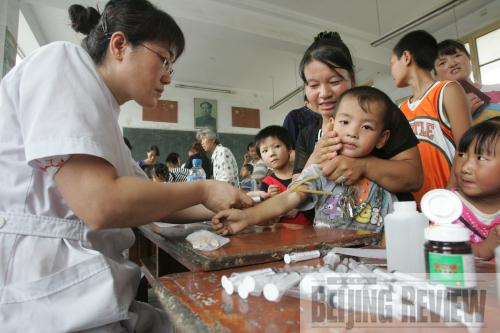|
 |
|
HOPING FOR THE BEST: Sunjia'nantou Village children in Shaanxi Province get their blood tested on August 10 (WANG ZHI) |
Xue Yani was worried that her 8-year-old son did not seem to be growing normally and that her 6-year-old nephew kept breaking out in spots on his scalp. So on July 6, the resident of Sunjia'nantou Village, Fengxiang County, in Shaanxi Province's Baoji City, took them to the hospital for tests.
The results shocked both her and her doctor. The lead content in the blood of the two boys was almost two-and-a-half times higher than normal.
Xue immediately laid the blame on Dongling Lead and Zinc Smelting Co., a heavy metal processing plant in Changqing Industrial Park near the village, which, she said, has polluted both the water and air in Sunjia'nantou Village since starting operations in 2006.
The lead found in the boys was not the first worrying case. In March, 6-year-old Miao Fan from the neighboring village of Madaokou went to the hospital with a stomachache. The diagnosis came back as lead-poisoning gastritis.
The news of the boys' plight swept through the two villages and caused a panic among the residents. Some parents rushed their children to the hospital and almost all tested positive for higher than normal lead levels.
Angered by the results, villagers blocked the factory gates on August 3 to demand its waste be tested. The factory's lead and zinc production was suspended on August 6.
The Baoji Municipal Environmental Protection Monitoring Station (BMEPMS) then sent a group of technicians to run tests.
"We collected 69 samples of groundwater, surface water, soil, air and sewage in the area to check for contamination," said Han Qinyou, head of BMEPMS. "The results show that the groundwater, surface water, soil and the company's waste discharge all meet national standards, but lead content in the air along the main roads near the company is 6.3 times that of monitoring sites 350 meters away from the roads."
The words sparked doubt and controversy among villagers and millions of Internet users monitoring the situation.
A woman surnamed Lei said she had collected a full bowl of black dust while cleaning her roof on weekends. "Whenever Dongling's workshops were operational, you would see black and silver dust in the air. Stand in the open air for a while and your body would be covered in dust. The pollution can even be checked by naked eyes," she said.
"I don't trust these results," said Wang Jihui, a woman from Sunjia'nantou Village. "If their discharges really met standards, how come so many children were poisoned?"
On August 15, the Fengxiang County Government held a press conference, confirming Dongling Lead and Zinc Smelting Co. is the main source of lead poison. The factory was shut down on August 17.
Victims
A total of 731 children aged 14 and under from the villages received free diagnostic tests from the county government on August 11; 615 were found to have excessive lead levels in their blood. Of those, 166 cases were considered serious, with lead levels of more than 250 mg per liter of blood compared with the normal range of zero to 100 mg a liter.
Villager Lei Xiaofei told Xinhua News Agency that his 9-year-old daughter Lei Xinyue's blood lead level registered at 506 mg per liter, the highest of all the children tested.
| 